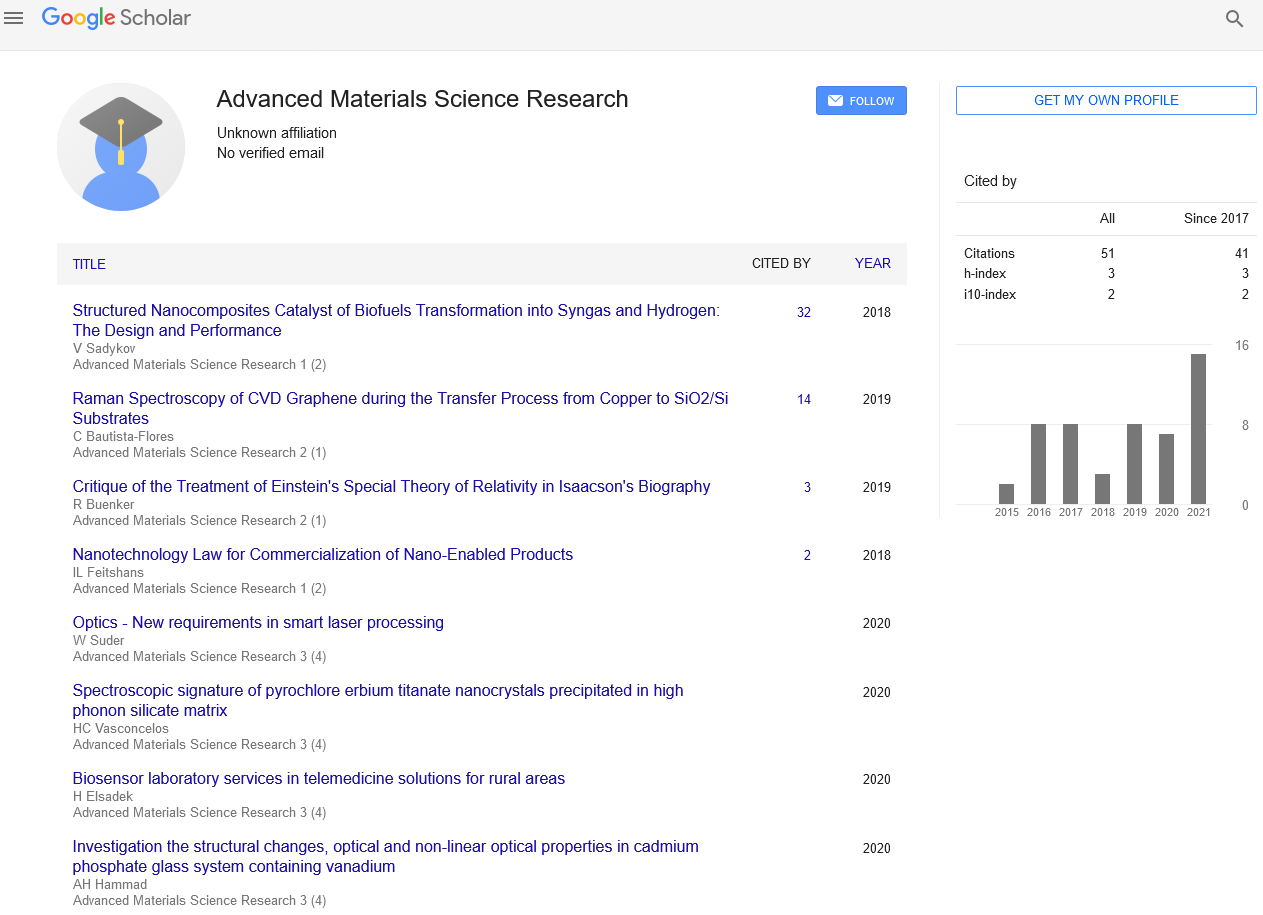Perspective - Advanced Materials Science Research (2023) Volume 6, Issue 5
Chemical Metallurgy: Unveiling the Alchemy of Materials
- Corresponding Author:
- Ya-Qun Zhou
Department of Chemistry,
Peking University,
Beijing,
China
E-mail: yqzhou@hust.edu.cn
Received: 04-Sep-2023, Manuscript No. aaamsr-23-118964; Editor assigned: 07-Sep-2023, PreQC No. aaamsr-23-118964 (PQ); Reviewed: 21-Sep-2023, QC No. aaamsr-23-118964; Revised: 03-Oct-2023, Manuscript No. aaamsr-23-118964 (R); Published: 19-Oct-2023, DOI: 10.37532/ aaasmr.2023.6(5).82-83
Introduction
Chemical metallurgy, often referred to as hydrometallurgy, is a critical branch of metallurgical science that plays a pivotal role in extracting and refining valuable metals from their ores. This field of study involves a complex interplay of chemistry, physics, and engineering principles to transform raw materials into the pure metals essential for various industries, from electronics to construction. In this article, we will delve into the fascinating world of chemical metallurgy, exploring its history, key processes, environmental considerations, and its vital importance in modern society.
Discussion
Historical roots
The roots of chemical metallurgy can be traced back to ancient times when humans first discovered the utility of metals like copper and gold. Early metallurgists relied on empirical techniques and a basic understanding of chemistry to extract metals from ores. For instance, the discovery of smelting in the Chalcolithic period marked a significant milestone in the history of metallurgy, allowing for the extraction of copper from its ores.
Key processes in chemical metallurgy
Chemical metallurgy encompasses a range of processes, each tailored to extract specific metals from their respective ores. Some of the fundamental processes in chemical metallurgy include:
Leaching: Leaching involves the dissolution of metal-containing ores in a suitable solvent, usually an acid or a base. This process helps separate the metal from the gangue (unwanted material). For example, gold can be extracted from its ore using a cyanide solution in a process known as cyanide leaching.
Solvent extraction: Solvent extraction is a technique used to separate and concentrate specific metals from solutions. It is particularly useful in the purification of metals like uranium, where organic solvents are employed to selectively bind and extract the desired metal ions.
Electrorefining: Electrorefining is a crucial step in the production of pure metals. It involves passing an electric current through a metal solution to separate impurities and obtain a highpurity metal product. Copper is commonly refined through electrorefining.
Smelting: Smelting is the process of melting ores to extract the metal. This is a crucial step in the extraction of metals like iron, where high temperatures are employed to separate the iron from its ore, typically iron oxide.
Precipitation: Precipitation is a method used to selectively remove specific metal ions from a solution by adding a chemical reagent. For example, adding sodium hydroxide to a solution containing copper ions will result in the precipitation of copper hydroxide.
Environmental considerations
As society’s awareness of environmental issues grows, so does the importance of sustainable practices in chemical metallurgy. Many traditional methods of metal extraction and refining can be environmentally harmful due to the generation of pollutants, toxic waste, and energy consumption. Researchers and engineers are constantly working on developing cleaner and more sustainable approaches to chemical metallurgy. Some of the environmental considerations include.
Recycling: Recycling plays a pivotal role in reducing the environmental impact of metallurgical processes. By reusing and recycling metals from end-of-life products, we can significantly reduce the need for energy-intensive mining and refining processes.
Green chemistry: Green chemistry principles aim to develop metallurgical processes that are environmentally friendly. This involves reducing the use of hazardous chemicals, minimizing waste generation, and optimizing energy consumption.
Alternative energy sources: The incorporation of alternative energy sources, such as solar and wind, into metallurgical processes can reduce the carbon footprint associated with energyintensive processes like smelting and refining.
Waste management: Proper disposal and treatment of waste materials generated during metallurgical processes are crucial. Implementing efficient waste management practices can help mitigate the environmental impact.
Importance in modern society
Chemical metallurgy is indispensable to modern society. From the gadgets we use daily to the construction of critical infrastructure, metallurgical processes underpin our way of life. Here are a few key areas where chemical metallurgy is essential.
Electronics: The production of semiconductors, microchips, and other electronic components relies on the extraction and refinement of metals like silicon, copper, and gold.
Transportation: The automotive and aerospace industries rely on metallurgical processes to create lightweight and durable materials essential for vehicle and aircraft construction.
Construction: Steel and other structural metals are essential in the construction of buildings, bridges, and other infrastructure.
Energy production: Metallurgical processes are crucial in the production of materials for renewable energy systems, such as wind turbines and solar panels.
Healthcare: Many medical devices and equipment, as well as pharmaceuticals, require the use of pure metals and metallurgical processes.
Conclusion
In conclusion, chemical metallurgy is a fascinating field that has evolved over millennia, from empirical practices to the sophisticated science and engineering of today. It plays a pivotal role in providing society with the essential materials needed for technological advancement, infrastructure development, and a sustainable future. With a growing emphasis on environmental sustainability, researchers and engineers continue to explore innovative approaches to make chemical metallurgy more eco-friendly and efficient, ensuring a brighter and greener future for all.

